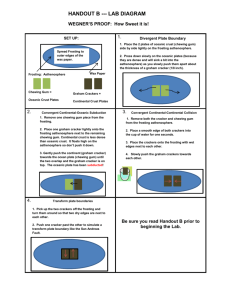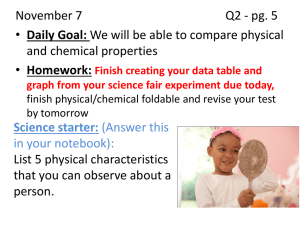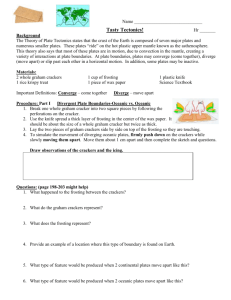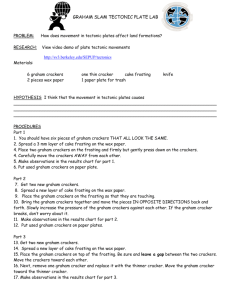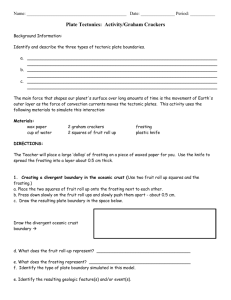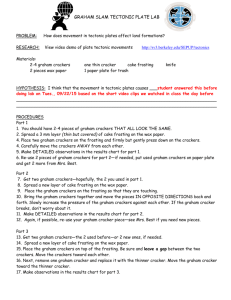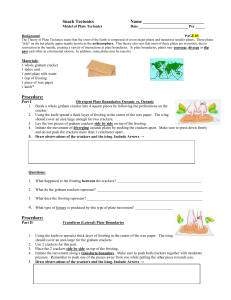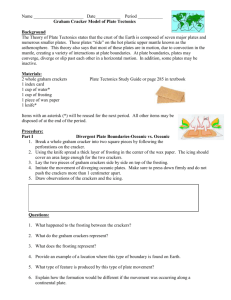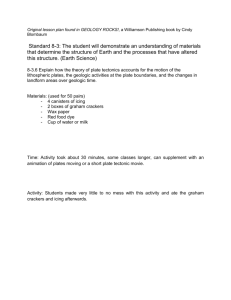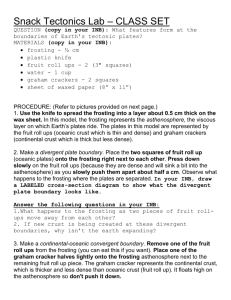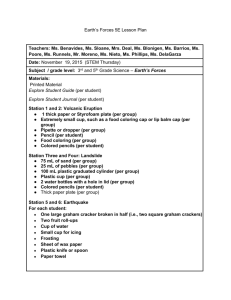Plate Tectonics Lab Activity
advertisement
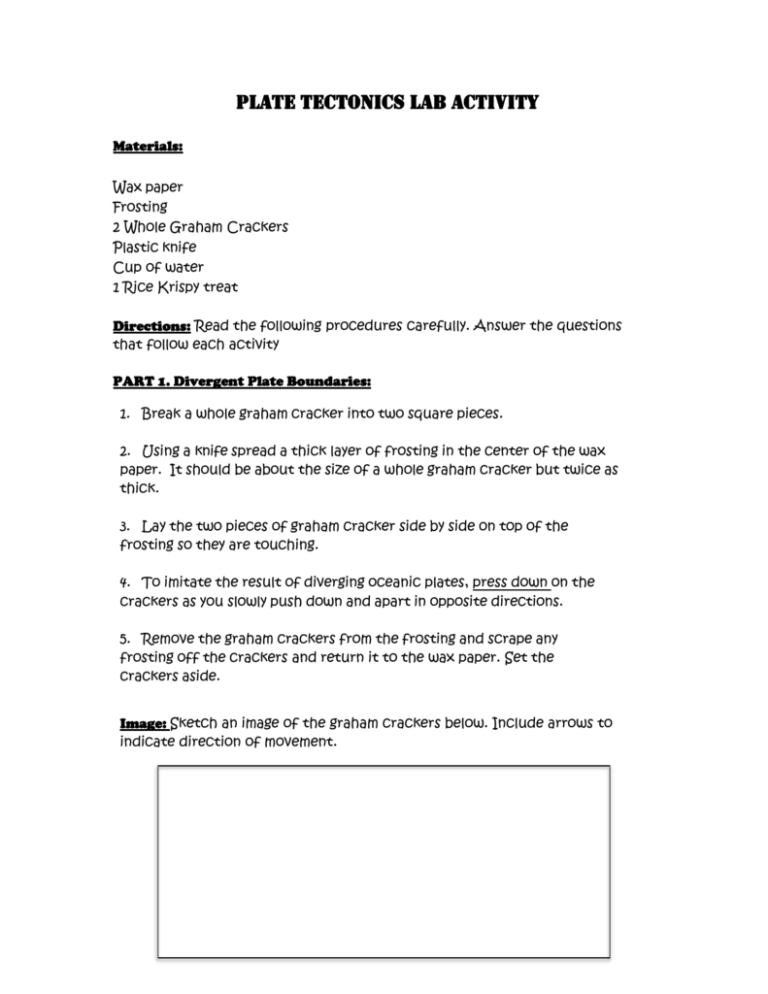
Plate Tectonics Lab Activity Materials: Wax paper Frosting 2 Whole Graham Crackers Plastic knife Cup of water 1 Rice Krispy treat Directions: Read the following procedures carefully. Answer the questions that follow each activity PART 1. Divergent Plate Boundaries: 1. Break a whole graham cracker into two square pieces. 2. Using a knife spread a thick layer of frosting in the center of the wax paper. It should be about the size of a whole graham cracker but twice as thick. 3. Lay the two pieces of graham cracker side by side on top of the frosting so they are touching. 4. To imitate the result of diverging oceanic plates, press down on the crackers as you slowly push down and apart in opposite directions. 5. Remove the graham crackers from the frosting and scrape any frosting off the crackers and return it to the wax paper. Set the crackers aside. Image: Sketch an image of the graham crackers below. Include arrows to indicate direction of movement. DISCUSSION QUESTIONS – PART 1 1. What happened to the frosting between the crackers? 2. What do the graham crackers represent? 3. What does the frosting represent? 4. Name a specific location on the Earth where this kind of boundary activity takes place. 5. What type of feature does this movement produce? 6. What is the process called that creates new ocean floor from diverging plates? PART 2. Convergent Plate Boundaries (Continental and Oceanic): 1. Take one of the graham cracker squares you used in Part 1 and lay it on top of the frosting. 2. Lay the Rice Krispy treat next to the graham cracker so they are almost touching, end to end. 3. Push the two “plates” slowly toward each other and observe which plate rides up over the other. Image: Sketch an image of the graham cracker and Rice Krispy treat below. Include arrows to indicate direction of movement. DISCUSSION QUESTIONS – PART 2: 1. What happens when a tectonic plate gets subducted? 2. What type of plate does the graham cracker represent? 3. What type of plate does the Rice Krispy treat represent? 4. Name a specific location on Earth where this type of boundary activity takes place. PART 3. Convergent Plate Boundaries (Continental): 1. Break the other whole graham cracker in half, and then break each half in half again so you have 4 pieces. Use only two of the pieces for Part 3, saving the other two for Part 5. 2. Each piece of graham cracker represents a continental plate. 3. Dip one end of each of the two graham crackers into a cup of water (about 2 cm). Immediately remove the crackers and lay them end to end on the frosting with the wet edges nearly touching. 4. Slowly push the two crackers together. Image: Sketch an image of the graham crackers. Include arrows to indicate direction of movement. DISCUSSION QUESTIONS – PART 3: 1. What happens to the wet ends of the graham crackers? 2. In what ways do the wet crackers act more like real crustal plates than the dry crackers? 3. What feature do the resulting ends of the wet crackers represent? 4. Name a specific location on Earth where this type of boundary activity takes place. PART 4. Convergent Plate Boundaries (Oceanic): 1. For this portion of the activity, you will recreate a convergent plate boundary that has not been demonstrated yet. 2. Decide whether you will use just graham crackers, just Rice Krispy Treats, or a combination of the two. 3. Decide how you will use the food to simulate this last type of convergent boundary. Image: Sketch an image below. Include arrows to indicate direction of movement. DISCUSSION QUESTIONS – PART 4: 1. What did you use to represent the two oceanic plates for this portion of the lab? 2. What happened when the two plates converged? 4. Name a specific location on Earth where this type of boundary activity takes place. PART 5. Transform Plate Boundaries: 1. Use the last two remaining graham cracker pieces for this part. Fit the two pieces together side to side on top of the frosting on the wax paper. 2. Place one hand on each of the graham cracker pieces and push them together by applying steady, moderate pressure. At the same time, also push one of the pieces away from you while pulling the other toward you. If you do this correctly, the cracker should hold while you increase the push-pull pressure, but will finally break from the opposite forces. Image: Sketch an image below. Include arrows to indicate direction of movement. DISCUSSION QUESTIONS – PART 5: 1. Name a specific location on the Earth where this type of boundary activity takes place. 2. Nothing happens at the beginning, but as the pressure is increased, the crackers finally break. What do we call the breaking and vibrating of the Earth’s crust? PLATE TECTONICS RESEARCH ACTIVITY Directions: Choose one of the famous landmarks on the back that you will research on the Internet. Answer the questions that follow. Create an 8” x 11” Travel Poster that features your landmark. Be sure to incorporate the answers to these questions on your poster, a picture of the landmark, and a diagram of the plate boundary. Don’t forget to make your poster appealing to tourists! What is the name of your travel agency? (1pt) ______ _____________________________________________________________ Which famous landmark did you chose? (1pt) ______ _____________________________________________________________ What continent/country/island/ocean/sea is this landmark in/near? (1pt) _____________________________________________________________ What tectonic plate(s) is this landmark a part of? (1pt) _____________________________________________________________ What type of plate boundary exists at this famous landmark? (1pt) _____________________________________________________________ How was this landmark formed? (5pts) ______________________________________________________________________________ ______________________________________________________________________________ ______________________________________________________________________________ __________ Why would tourists want to visit this landmark? What is special about it? (5pts) ______________________________________________________________________________ ______________________________________________________________________________ ______________________________________________________________________________ __________ Picture of Landmark (2.5pts) ______ Plate Boundary Diagram With Arrows (2.5pts) ______ Total Points (20pts) __________ ChoOse One of the Following Rio Grande Rift East African Rift Mid Oceanic Ridge Mariana Trench Himalayas San Andreas Fault Alpine Fault Ring of Fire Aleutian Islands St. Lucia Cascade Mountain Range
